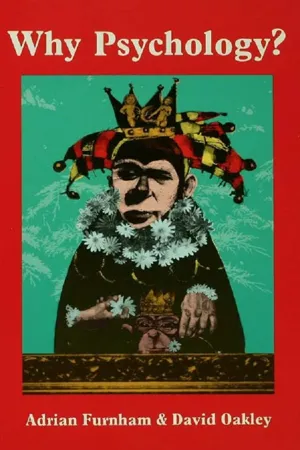
- 128 pages
- English
- ePUB (mobile friendly)
- Available on iOS & Android
Why Psychology?
About this book
Psychology has been the fastest growing student discipline in recent years and in Why Psychology? the unique essence, attraction and diversity of the subject is introduced for the uninitiated in an accessible and attractive way. It will be suitable for school students considering studying psychology in college or university, for those considering a change in career, for parents, careers officers and others who advise students of all ages. It will also be required reading for anyone who has ever wondered just what psychology involves but was not sure where to find out.
Why Psychology? will be the starting point for a whole generation of new psychologists at the stage where they are asking the fundamental question about their academic future -- which subject should I study? It provides an intelligent and accessible answer as to why psychology might be for them. What it means to study and practise psychology is explained in this introduction to an often misunderstood field. It provides a broad view of the scope of psychology and shows its rich diversity and depth in an accessible introductory style. The book is intended for "A"-level students considering their degree options; careers advisors; degree-level students with a subsidiary choice to make; and general low-level psychology market.
Tools to learn more effectively

Saving Books

Keyword Search

Annotating Text

Listen to it instead
Information
Chapter 1
Common-sense views and misconceptions about psychology
Introduction
+ = | belief that people are trustworthy, moral and responsible |
- = | belief that people are untrustworthy, immoral and irresponsible |
+ = | belief that people can control their outcomes and that they understand themselves |
- = | belief that people lack self-determination and are irrational |
+ = | belief that people are altruistic, unselfish and sincerely interested in others |
- = | belief that people are selfish and self-centred |
+ = | belief that people are able to maintain their beliefs in the face of group pressures to the contrary |
- = | belief that people give in to pressures of group and society |
+ = | belief that people are different from each other in personality and interests and that a person can change over time |
- = | belief that people are similar in interests and are not changeable over time |
+ = | belief that people are complex and hard to understand |
- = | belief that people are simple and easy to understand |
Table of contents
- Front Cover
- Half Title
- Title Page
- Copyright
- Dedication
- Contents
- Preface
- 1 Common-sense views and misconceptions about psychology
- 2 Background and history of psychology
- 3 Major research methods in psychology
- 4 What goes on in psychology?
- 5 Uses (and possible abuses) of psychology
- 6 Taking things further
- References
- Index
Frequently asked questions
- Essential is ideal for learners and professionals who enjoy exploring a wide range of subjects. Access the Essential Library with 800,000+ trusted titles and best-sellers across business, personal growth, and the humanities. Includes unlimited reading time and Standard Read Aloud voice.
- Complete: Perfect for advanced learners and researchers needing full, unrestricted access. Unlock 1.4M+ books across hundreds of subjects, including academic and specialized titles. The Complete Plan also includes advanced features like Premium Read Aloud and Research Assistant.
Please note we cannot support devices running on iOS 13 and Android 7 or earlier. Learn more about using the app